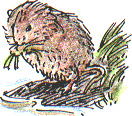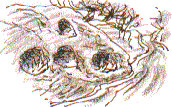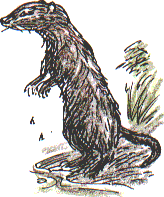 |
A Last DitchFriday 24th August 2001, West Yorkshire |
![]()
![]()
![]()
![]()
![]()
![]() This Month
Rocks
History
Workshop
Links
Home Page
This Month
Rocks
History
Workshop
Links
Home Page
![]()
 I'M CHATTING to a pest control officer. Knowing of my interest in wildlife, he tells me about a local beck that runs through town. It's one of those places that gets supermarket trollies pushed into it. The residents have been complaining about the increasing numbers of rats that have been showing up there.
I'M CHATTING to a pest control officer. Knowing of my interest in wildlife, he tells me about a local beck that runs through town. It's one of those places that gets supermarket trollies pushed into it. The residents have been complaining about the increasing numbers of rats that have been showing up there. He sent two of his men to walk the length of the stream. They found no evidence of Brown Rats but found Water Voles - the harmless vegetarian rodent often known as the 'water rat' - living along its entire length. In the country as a whole water vole numbers have plunged over the last 20 years, so this urban setting is now an important stronghold for them.
He sent two of his men to walk the length of the stream. They found no evidence of Brown Rats but found Water Voles - the harmless vegetarian rodent often known as the 'water rat' - living along its entire length. In the country as a whole water vole numbers have plunged over the last 20 years, so this urban setting is now an important stronghold for them.Mink
 It seems that one of the reasons for their decline is the rise in numbers of feral Mink. My friend describes the animal liberation activists who release mink into the countryside as misguided. He believes that they don't appreciate the damage that this introduced predator can inflict on our native wildlife. He tells me that, like a fox, a mink will kill more prey than it needs, if circumstances allow. There's one at large on a local nature reserve and this could be a disaster for ground-nesting birds.
It seems that one of the reasons for their decline is the rise in numbers of feral Mink. My friend describes the animal liberation activists who release mink into the countryside as misguided. He believes that they don't appreciate the damage that this introduced predator can inflict on our native wildlife. He tells me that, like a fox, a mink will kill more prey than it needs, if circumstances allow. There's one at large on a local nature reserve and this could be a disaster for ground-nesting birds.Trap-line
 The best way to catch a mink, he tells me, would be to set half a dozen box cage traps, of the type that is sprung when the animal triggers a trap door as it enters by crossing a see-saw platform. This traps the mink without injuring it. These traps should be disguised with vegetation so that they're not obvious as man-made objects (although I expect they'd blend in well with all those supermarket trollies). They should each be baited with a piece of fresh fish every day; an expensive and time-consuming process.
The best way to catch a mink, he tells me, would be to set half a dozen box cage traps, of the type that is sprung when the animal triggers a trap door as it enters by crossing a see-saw platform. This traps the mink without injuring it. These traps should be disguised with vegetation so that they're not obvious as man-made objects (although I expect they'd blend in well with all those supermarket trollies). They should each be baited with a piece of fresh fish every day; an expensive and time-consuming process.I suggest to him that mink are so difficult to catch because they're such intelligent creatures. His opinion is that they not exactly intelligent in the sense of being adaptable; faced with a particular situation he says that they will invariably behave in the same way.
![]()
Richard Bell,
wildlife illustrator
E-mail; 'richard@willowisland.co.uk'
![]() Next page
Previous page
This day last year
This month
Nature Diary
Home Page
Next page
Previous page
This day last year
This month
Nature Diary
Home Page
![]()